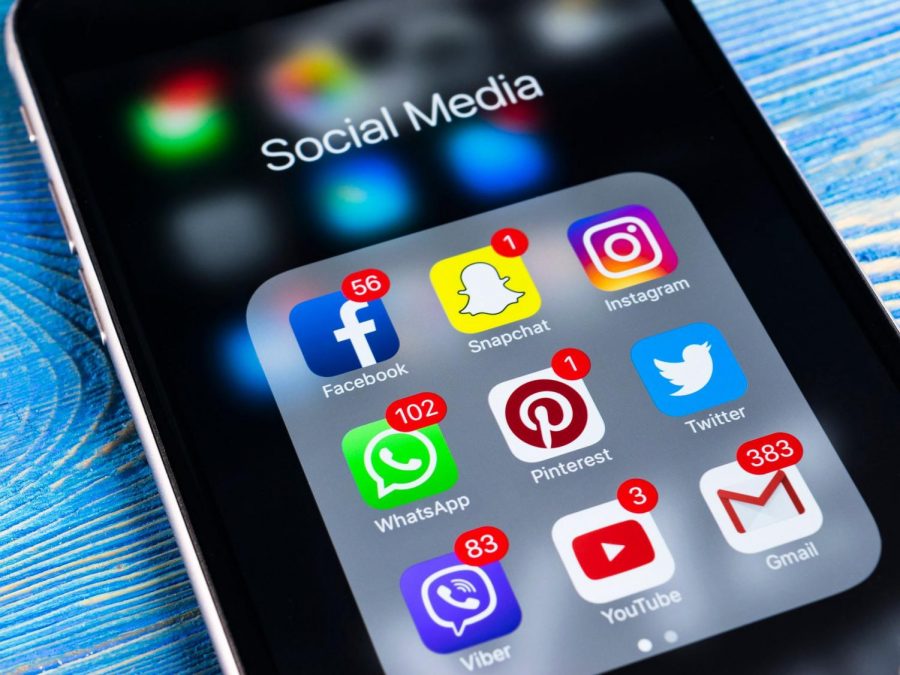Social Media Gone Psycho
Social media takes a toll on the minds of the world’s youth. Where or when did it go wrong?
Red bars floating over app icons, the social media apps entice their viewers into clicking on them. What they don’t know is that they’re in for a world of hurt.
Social media giant Facebook has recently been under intense scrutiny following the bombshell revelations of former employee, now whistleblower, Frances Haugen. While testifying before a senate sub-committee and in the wake of Facebook’s rollout of Instagram for Kids, this data scientist warned the public of the corporate giant’s true motives.
“They put their astronomical profits before people,” said Haugen. The lure of social media can be self-destructive to its users, particularly impressionable teens, some of which act like hamsters on an endless turning wheel.
Haugen’s testimony, coupled with over a thousand pages of confidential documents that she copied before leaving Facebook, might be the most threatening scandal it has faced to date.
Over the last decade she worked on Facebook’s secretive “engagement-based ranking” algorithm tool. This tool allows Facebook to pick luring content for the user, often unsolicited.
“They have to find new users. The way they’ll do that is by making sure that children establish habits before they have good self-regulation,” said Haugen.
Facebook countered that Instagram for Kids, intended for ages 10 to 12 years, will be even safer for children. Facebook claims their algorithms have filters in place to protect children. Although it is possible to build safe filters, Haugen testified that Facebook has chosen not to.
“Facebook chooses to mislead and misdirect. Facebook has not earned our blind faith.”
In response, skeptical lawmakers, including Senator Blackburn from Tennessee, focused on Facebook’s platform, Instagram, and expressed concern towards its impact on children.
“It is clear that Facebook prioritizes profits over the well-being of children and all users,” Blackburn said.
One Facebook study leaked by Haugen found that 13.5% of U.K. teenage girls said that their suicidal thoughts increased after starting on Instagram. Another study found that 17% of teen girls admitted that their eating disorders worsened after using the app. Another 32% of teen girls said that the app made them feel bad about their bodies. Nevertheless, Facebook tried to keep these studies private, not even making them available to concerned employees.
Facebook’s founder, Mark Zuckerberg countered Haugen’s claims saying that it “is disheartening to see that work taken out of context and used to construct a false narrative.”
However, independent studies support Haugen’s claims. A 2021 study published by the University of Pisa examined Facebook, Instagram, Twitter, and TikTok. Over 793 adults between the ages of 18 and 77 completed the survey. The study showed that social media use increased during the pandemic across all platforms. It revealed that active use (i.e., participating in posted conversations) of Facebook was associated with negative affect such as sadness, angry feelings, and anxiety.
Similarly, in an article from The Wall Street Journal, their study concluded that 32% of teenage girls felt that Instagram only worsened their body insecurities. A EClinical Medicine study likewise showed that 78% of 14-year-old boys and girls were dissatisfied with their body weight due to social media usage.
“When our identity is wrapped up with trying to impress everyone else, whether online or URL, it’s almost guaranteed to be an unhealthy situation,” a Fox News anchor said.
The Facebook whistleblower’s disturbing revelations provide an ominous insight into the company’s own research revealing the negative effects on its users, who believe the app will make them feel better, not worse.
“This is part of what makes social media so insidious: If it makes you feel awful, the first solution to present itself is to post and consume content about how it’s OK to feel awful, making the experience seem meaningful and dramatic — much like a reality show.”

